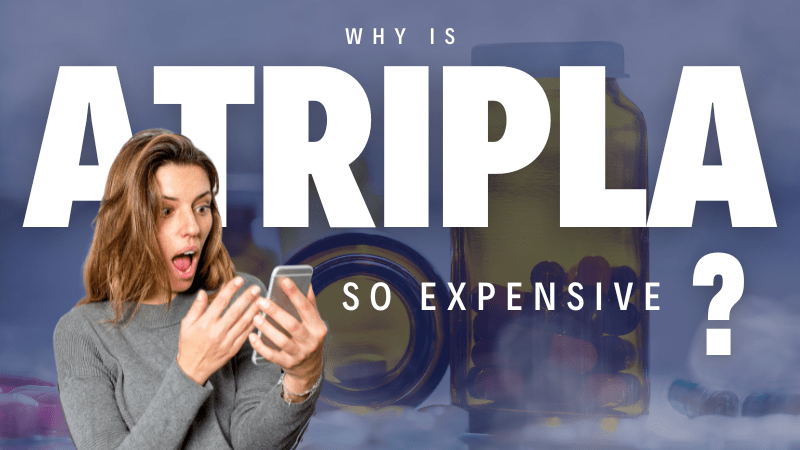The soaring costs of pharmaceuticals, especially vital medications like Atripla, have become a source of concern for many individuals seeking effective treatment for HIV. In this blog post, we delve into the intricate factors contributing to the high price tag of Atripla, addressing the question on everyone’s mind: Why is Atripla so expensive?
Atripla is a medication used in the treatment of HIV (Human Immunodeficiency Virus) infection. It is a fixed-dose combination drug, meaning it contains three active ingredients in a single tablet: Efavirenz, Emtricitabine, and Tenofovir Disoproxil Fumarate.
Atripla is taken once daily and is highly effective in suppressing HIV viral replication, helping to manage the infection and improve the immune system. As with any medication, it may cause side effects, and individuals are advised to consult their healthcare provider for personalized guidance. Keep on reading to know more about Why is Atripla so expensive?
How does Atripla work?

Atripla is a combination medication used in the treatment of HIV infection. It contains three active ingredients: Efavirenz, Emtricitabine, and Tenofovir Disoproxil Fumarate. Each of these components works synergistically to inhibit different stages of the HIV life cycle.
Efavirenz belongs to a class of drugs called non-nucleoside reverse transcriptase inhibitors (NNRTIs). It acts by blocking the action of reverse transcriptase, an enzyme necessary for the replication of the virus. This inhibition prevents the conversion of HIV RNA into DNA, hindering the virus from integrating into the host cell’s genetic material.
Emtricitabine and Tenofovir Disoproxil Fumarate are both nucleoside reverse transcriptase inhibitors (NRTIs). They work by interfering with the action of reverse transcriptase as well but at a different stage. Emtricitabine and Tenofovir Disoproxil fumarate are incorporated into the growing viral DNA chain, causing premature termination and preventing the completion of the viral DNA.
Generic Atripla:

In the context of Atripla, which is a combination medication containing Efavirenz, Emtricitabine, and Tenofovir Disoproxil Fumarate, the availability of generic versions may depend on the expiration of patents held by the original drug manufacturer. Once these patents expire, other pharmaceutical companies may produce generic equivalents, offering more affordable options to consumers.
LifeRx Pharmacy sells generic Atripla. Individuals need to consult their healthcare providers to discuss the availability of generic alternatives, potential cost savings, and any considerations related to the switch. Generic versions of Atripla may be available from various pharmaceutical manufacturers.
Generic drugs are bioequivalent to their brand-name counterparts, meaning they have the same active ingredients, strength, dosage form, and intended use. The availability of generic Atripla can provide a more cost-effective option for individuals managing HIV, as they often come with a lower price tag compared to brand-name medication. Read on to understand Why is Atripla so expensive.
How much does Atripla cost with insurance?

The cost of Atripla with insurance can vary depending on the specific insurance plan, coverage details, and the terms negotiated between the insurance company and the pharmacy.
To get accurate and up-to-date information on the cost of Atripla with insurance, it is recommended to:
- Check with your insurance provider: Contact your health insurance provider directly to inquire about the coverage details for Atripla. You can find information about copayments, deductibles, and any restrictions on the specific pharmacy network.
- Contact the pharmacy: Reach out to the pharmacy where you plan to fill your prescription. Pharmacies often have information on the cost of medications with various insurance plans.
- Consult with your healthcare provider: Your healthcare provider can assist you in navigating insurance coverage, and they may also be aware of any assistance programs or discounts that could help reduce the cost of Atripla. Keep on reading to know more about Why is Atripla so expensive.
How much does Atripla cost without insurance?

The cost of Atripla without insurance can vary based on factors such as the pharmacy you visit, your geographic location, and any available discounts or assistance programs.
It’s important to note that medication prices can change over time, and new developments, including the availability of generic versions, may impact the cost. This blog gives a clear understanding of Why is Atripla so expensive.
As a reference, the average retail price on LifeRx Pharmacy for a 30-day supply of Atripla without insurance was several hundred to over a thousand dollars. However, prices can fluctuate, and discounts or assistance programs may be available to help lower the cost for individuals without insurance.
Why Is Atripla So Expensive?

The high cost of Atripla, like many other brand-name medications, can be attributed to several factors within the pharmaceutical industry.
Here are some key reasons why is Atripla so expensive:
- Manufacturing Expenses: The production of Atripla involves complex manufacturing processes and requires high-quality ingredients. Strict quality control measures and adherence to regulatory standards contribute to the cost of manufacturing.
- Research and Development Costs: The development of a new medication involves significant research and development expenditures. This includes extensive clinical trials to ensure the drug’s safety and efficacy. The costs associated with discovering and testing new drugs contribute to the overall pricing.
- Combination Medication: Atripla is a combination medication containing three active ingredients (efavirenz, emtricitabine, and tenofovir disoproxil fumarate). Developing and manufacturing combination drugs can be more intricate and costly than single-agent medications.
- Exclusive Patents: Pharmaceutical companies are granted exclusive rights through patents, allowing them to be the sole producer and seller of a particular drug for a certain period. During this exclusivity period, which can last for several years, the company can recoup its investment. The lack of competition during this time can contribute to higher prices.
- Ongoing Research and Innovation: The pharmaceutical industry is continuously researching and developing new drugs and formulations to improve existing treatments. The costs associated with ongoing innovation and staying ahead of evolving medical needs contribute to the overall expense.
- Market Dynamics: The pricing of medications is influenced by market dynamics, including the bargaining power of pharmaceutical companies, negotiations with insurance providers, and the overall healthcare system structure.
Addressing the question directly, “Why is Atripla so expensive?” involves considering these various factors. While high prices are often necessary to support research and development and ensure the quality of medications, they can pose challenges for accessibility and affordability, leading to ongoing discussions about healthcare costs and the need for more sustainable pricing models.
FAQs:
What is a common concern when taking Atripla?
A common concern when taking Atripla is the potential for central nervous system side effects, including vivid dreams, dizziness, and sleep disturbances, primarily due to the presence of efavirenz in the medication.
Can Atripla be used for PEP?
Yes, Atripla can be used for post-exposure prophylaxis (PEP) to prevent HIV infection after potential exposure, but it’s essential to consult with a healthcare professional for guidance and prescription.
Can you crush Atripla?
No, it is not recommended to crush Atripla. Atripla is typically available as a fixed-dose combination tablet, and crushing or breaking it may alter the intended release and absorption of the individual components.
Does Atripla cause weight gain?
Weight gain is not commonly associated with Atripla, but individual responses to medications can vary. If someone is concerned about weight changes while taking Atripla, they should discuss it with their healthcare provider for personalized advice.
How long does Atripla stay in your system?
Atripla has a half-life of approximately 40 hours, so it typically stays in the system for several days after the last dose. Factors such as individual metabolism may influence variations in drug clearance. If you want to know more about Why is Atripla so expensive, you can read our section on our website.


